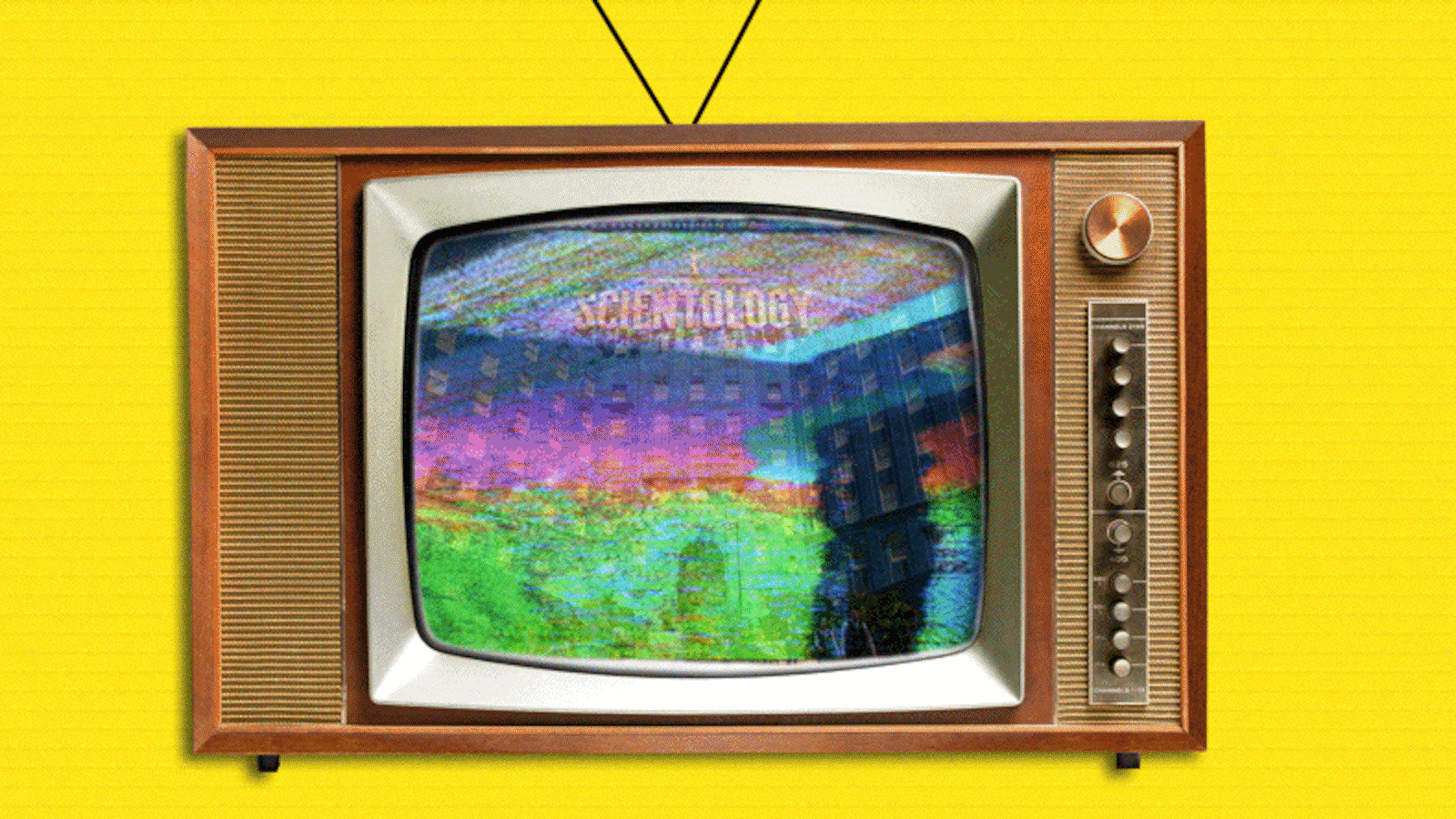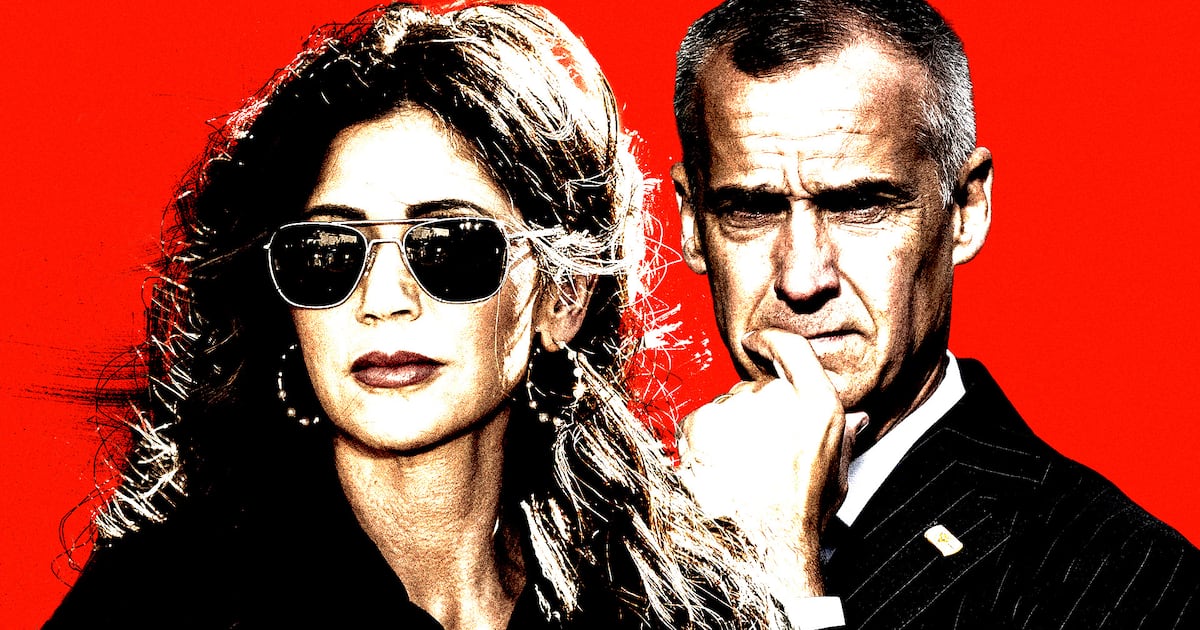David Miscavige, leader of the Church of Scientology and boon companion to Tom Cruise, has a deep, honeyed voice, a kindly smile, and penetrating sky-blue eyes that go together well with his expensively tailored blue-serge suit and muted gray tie.
And although he is quite compact—an impression made unavoidable by the many photographs of the blond-pompadoured Miscavige grinning and standing an inch or two shorter than his already-diminutive movie-star pal—he radiates Alpha maleness, a comfort with power and, one has to admit, a certain charismatic charm.
“We’re not here to preach to you, or to convince you, or to convert you,” the 57-year-old Miscavige—whose formal title is Chairman of the Board of the Religious Technology Center—declared as he introduced Monday night’s launch of the Scientology Network. The premiere of the round-the-clock television channel starting at 8 p.m. was carried on DirecTV to some 20 million subscribers as well as on a variety of web platforms and apps.
Industry observers speculated that the church must be forking over around $4 million a year in carriage fees, and possibly more, for the privilege of occupying DirecTV’s Channel 320; spokespeople for DirecTV and its parent company, AT&T, didn’t respond to requests for comment, while the Church’s media relations department simply emailed: “Yes, we are launching our own TV network across all platforms Monday, 8 p.m. EDT. More information will be available once we begin airing. Regards.”
Making his unexpected appearance in the vast, light-dappled atrium of Scientology’s so-called Spiritual Center in Clearwater, Florida, the normally publicity-shy Miscavige—publicity-shy because so much of it is bad—faced the camera and invited viewers, “Take a look and decide for yourself.”
He added: “There’s a lot of talk about us. We get it. People are curious… Frankly, whatever you have heard, if you haven’t heard it from us, I can assure you, we are not what you expect.”
New York journalist Tony Ortega, a severe critic of Scientology on his blog The Underground Bunker, said he was surprised that Miscavige took such a prominent public role in the channel’s debut. “I have to give him credit,” Ortega told The Daily Beast, adding that Miscavige seemed an effective, if untrustworthy, salesman.
Indeed, on the Scientology Network, Miscavige was not the vindictive and ruthless autocrat portrayed in his banished father Ron Miscavige’s 2016 memoir (the two had a falling out after the elder Miscavige left the church); nor the paranoid narcissist of numerous press accounts, an ill-tempered, litigious bully who psychically and physically abuses his underlings.
Nor was he the David Miscavige of Alex Gibney and Lawrence Wright’s HBO documentary Going Clear and apostate actress Leah Remini’s series on the A&E network, Scientology and the Aftermath.
In what seemed like a cheeky act of counterprogramming, an Investigation Discovery exposé—which also aired at 8 p.m. opposite the Scientology Network’s debut—chronicled Miscavige’s alleged responsibility in the starvation death of a troubled follower, Lisa McPherson, under the church’s care, and the sudden disappearance from public view of his estranged wife Shelly.
It has to be said that the ID Channel show—based on a magazine piece by Vanity Fair contributing editor Ned Zeman—was far more watchable than the Scientology Network’s relentlessly upbeat, slick yet hard-to-swallow portrayal of the 64-year-old religion invented as a tax dodge by the late science fiction writer and flim-flam man L. Ron Hubbard (the subject of a three-part series on the network that presents his fraudulent self-history as hagiography.)
There was nothing live or spontaneous about Monday night’s premiere—not even scenes of the gala Scientology party celebrating the new network’s launch. Various video packages—usually to the accompaniment of incantatory new-age music or, upping the positivity, a driving, percussive beat—had an airless, hermetically sealed quality.
The videos claimed that Scientology—apparently a multicultural, multiracial heaven on earth, with millions of adherents around the planet (nevermind estimates by critics of less than 60,000)—had saved crumbling marriages, shown a pro athlete how to breathe properly, quieted gang violence in South Central Los Angeles, bucked up the spirits of California firefighters, and guided custom banjo makers Greg and Janet Deering to triumph on the Nashville music scene, among other miracles.
Scientology might operate like an enormously profitable tax-free business, relying on the hard labor of unpaid, maltreated acolytes to accrue cash and capital, according to reports. But, per the new channel’s programming fare, a series of lengthy commercials punctuated by briefer commercials, the religion also offers humans—or “thetans”—all the tools necessary to cure the world’s ills while stockpiling mass quantities of wealth, success, love, sex, and happiness through strict adherence to Hubbard’s loopy and voluminous copyrighted “scriptures,” along with regular grillings by an “auditor” while grasping the electrodes of an E-Meter.
“From that point on, life is simple,” gushed one young woman who claimed her auditing sessions on the E-Meter banished her anxieties.
Another woman described Scientology’s aims thusly: “To make the able more able.”
The religion’s representatives on the channel, by the way, are uniformly attractive, with good teeth, great hair, and a healthy sheen.
Left unmentioned Monday night on the Scientology Network were the many thousands of dollars in course tuitions frequently associated with all this spiritual self-improvement, lest sticker shock induce aneurysms or possibly even strokes in unsuspecting viewers.
The Scientology Network’s headquarters are located in downtown Hollywood, not far from the Church’s Celebrity Centre, where Cruise, John Travolta, Kirstie Alley, and other entertainers regularly pay their respects. In 2011, the church purchased the four-acre Sunset Boulevard facilities from KCET for $45 million (not included in the sale was the independent public television station’s broadcast license), and then spent millions more to transform it into a state-of-the-art production center.
“KCET sold an aging studio that needed a lot of work, and they got $45 million and they got to keep their license—that’s like, oh, man, they saw these idiots coming,” marveled Scientology critic Jeffrey Augustine, a former member of the church who has spent years studying its complex financial structures.
Still, it was ultimately a favorable deal for both parties. Because the new venture doesn’t require a government-issued license—it uses the internet and satellite transmission, not the broadcast spectrum—the Scientology Network is not subject to regulation by the Federal Communications Commission.
What’s more, by spending money on the channel, the church is actually fulfilling one of the main requirements of its tax-free status, which Bill Clinton’s Internal Revenue Service awarded in 1993 after Cruise and Travolta lobbied the president and Congress—and Scientologists filed more than 1,400 personal lawsuits against individual IRS agents until the agency removed its longstanding opposition.
“In order to maintain its tax-exempt status, the church can’t hoard money,” Augustine said, “and they have to spend money in the benefit of the public to satisfy IRS requirements.”
Beyond that, the new channel serves “to divert attention from the steadily declining state of Scientology in the world with a show of ‘We’re here, we’re strong, and we are proud,’” emailed Scientology defector Mike Rinder, the religion’s former chief spokesman. “Though this is what Miscavige TELLS his followers, in truth this step is nothing of the sort, as it’s actually accomplishing nothing they don’t already have.
“He cannot afford to have anyone speak to the media or attempt to counter the stream of negative press that Scientology gets. No spokesperson can deal with the inevitable questions that would come if they were to be questioned by any reporter. So, they have to ‘speak’ through controlled media.”
Rinder added that Miscavige can use the new channel as a fundraising tool with wealthy donors, arguing that the mere existence of the Scientology Network demonstrates that the religion is expanding and deserves their support.
“Will it be successful? From Miscavige’s perspective, it already is,” Rinder emailed. “He has been able to point to this another significant ‘accomplishment’ and that is all that matters. He will be telling them at their next event ‘three people every second tuned in’ or some other such rubbish. When the metrics of viewership become available, it's going to be clear to everyone else in the world what a bomb this is—but that doesn't matter to Miscavige… I doubt they get a single person to come in the door as a result. In any other organization this would be catastrophic. Miscavige just spins it as a ‘big win’ and the Scientologists follow suit.”






